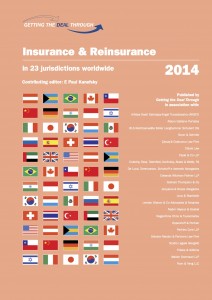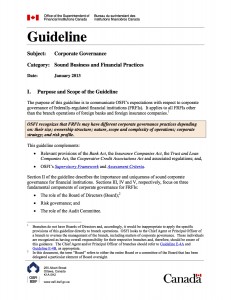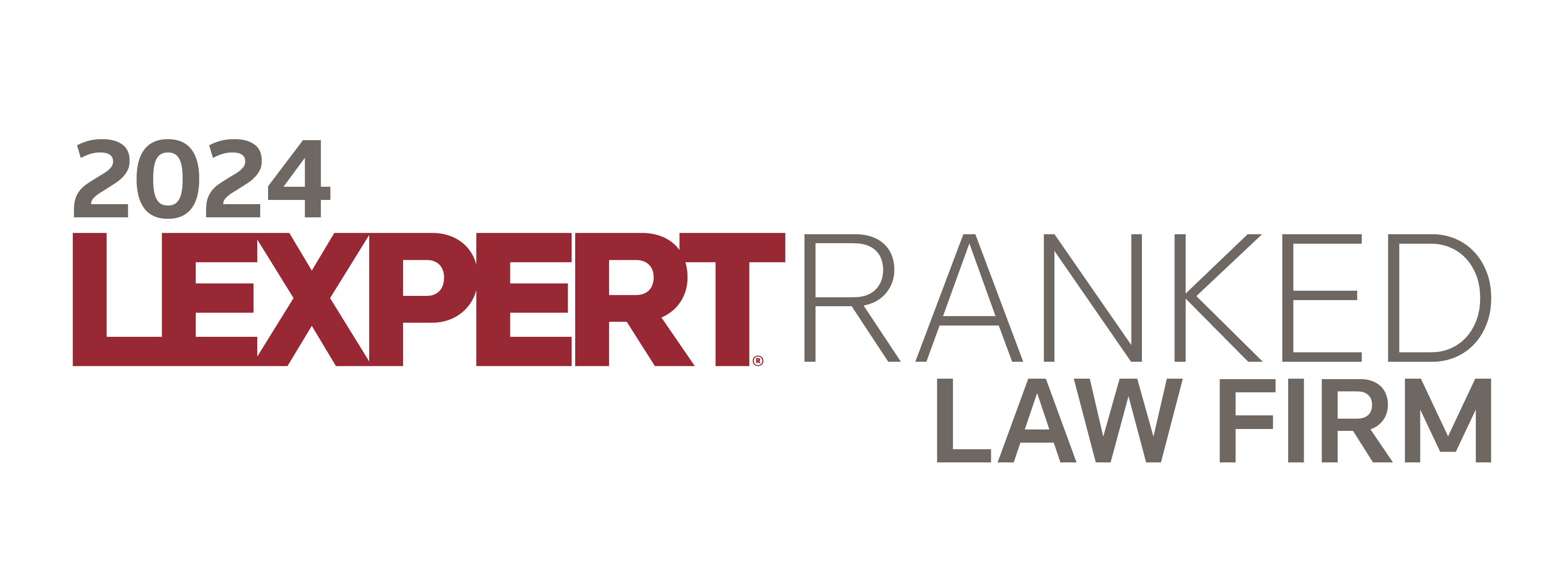New regulations to the Insurance Companies Act (Canada), which permit the demutualization of federal property and casualty mutual insurance companies, were published in the July 1, 2015 edition of the Canada Gazette. Two separate regulations were published. One set of regulations applies to mutual P&C insurance companies that have only mutual policyholders (click here to view). The second set of regulations applies to mutual P&C insurance companies that have both mutual and non-mutual policyholders (click here to view).
All posts by Roisin Hutchinson
Saskatchewan Proposes to Modernize its Insurance Legislation
The Government of Saskatchewan has given its first reading to Bill 177: The Insurance Act. The new legislation will replace The Saskatchewan Insurance Act, which has not been revised substantially in several decades. Bill 177 aims to modernize the regulation of the insurance industry in the Province of Saskatchewan, improve consumer protection measures and increase harmonization with the insurance legislation of the other western provinces. The full text of Bill 177 can be viewed here.
The following excerpt from a Government of Saskatchewan press release provides more detail concerning the proposed legislation:
““A lot has changed in the industry since revisions were last made to the Act, especially when it comes to technology,” Justice Minister and Attorney General Gordon Wyant said. “The new Act will give the insurance sector the flexibility it needs to evolve in a rapidly changing environment, strengthen consumer protection, and move toward harmonizing insurance legislation with Alberta and BC.”
Changes proposed in The Insurance Act include:
- Better protection for consumers through market conduct standards, which identify unfair practices;
- Streamlining the appeal process;
- Restructuring the Saskatchewan Insurance Councils and allowing them to conduct audits and investigations;
- Requiring insurance companies to recommend and screen those applying to be intermediaries as well as supervise them once approved;
- Updating licensing categories and requirements including licensing employees that sell insurance as insurer’s representatives, which requires the same level of training as insurance agents;
- Permitting insurance agents to adjust insurance claims to a prescribed amount; and
- Requiring insurers to point to specific clauses in a policy where there are limits on the amount payable.
Work to develop the new Act involved interprovincial comparisons and review of other provincial and national projects on insurance and financial services, but the model used in Alberta was deemed to best fit Saskatchewan’s needs. Alberta’s legislation is similar to that in BC, meaning Saskatchewan will share similar insurance regulation with all provinces in the New West Partnership Trade Agreement.
A number of industry associations were consulted, including the Insurance Brokers Association of Saskatchewan and the Saskatchewan Insurance Councils and they have expressed their support for modernization of the Act.”
Manitoba Restricted Insurance Agent License Regime for Incidental Sellers of Insurance Takes Effect on June 1, 2015
On January 1, 2015, certain amendments to Manitoba’s The Insurance Act came into force requiring incidental sellers of insurance to hold a restricted insurance agent’s license in Manitoba as of June 1, 2015. See Section 72 of the The Insurance Amendment Act S.M. 2012, c. 29 (“Bill 27”) for full text of the amendments. These amendments in Bill 27 are the second instalment in a series of amendments that were proclaimed to come into force in three parts: on September 1, 2014, January 1, 2015 and March 1, 2015, and which bring Manitoba’s The Insurance Act closer in line with Alberta’s Insurance Act.
This second group of amendments implements a restricted insurance agent licensing regime similar to those in place in Alberta and Saskatchewan. In addition to the amendments to The Insurance Act, the Manitoba Insurance Agents and Adjusters Regulation was also amended to set out the particulars of the new licensing regime (see M.R. 215/2014 for the amendments to the regulation proclaimed in force on January 1, 2015). Under the new restricted agent licensing regime, incidental sellers of insurance are required to obtain a restricted insurance agent license from the Insurance Council of Manitoba. Incidental sellers of insurance that will require a restricted agent license include deposit-taking institutions, travel agencies, mortgage brokers and funeral directors and other specified entities that, in the course of selling certain goods or services to their customers or clients, offer certain classes of insurance that relate to those goods or services.
The Insurance Council of Manitoba has announced that it will begin accepting applications for restricted insurance agent licences on February 1, 2015, and has advised that applications must be received prior to April 30, 2015 to ensure they are issued prior to June 1, 2015. The Insurance Council of Manitoba issued a Notice in December 2014 with further information about the transition, which is available here.
Federal Government Releases Draft Regulations for the Demutualization of Property and Casualty Mutual Insurance Companies
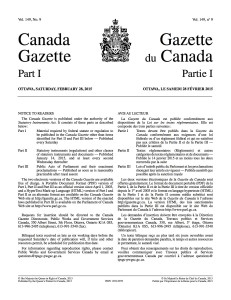 In the issue of the Canada Gazette released today, the federal government published long-awaited draft regulations which will permit Canada’s federal property and casualty mutual insurance companies to demutualize. The text of the draft regulations can be seen by clicking here. Interested parties are invited to make representations concerning the proposed regulations within 30 days.
In the issue of the Canada Gazette released today, the federal government published long-awaited draft regulations which will permit Canada’s federal property and casualty mutual insurance companies to demutualize. The text of the draft regulations can be seen by clicking here. Interested parties are invited to make representations concerning the proposed regulations within 30 days.
Marcotte Decision Will be Studied Closely by Canadian Banks
The Marcotte Trilogy
Application of the CPA
Interjurisdictional Immunity
Paramountcy
The SCC’s decision in Marcotte makes it clear that some provincial legislation applies to federally-regulated activities. Certainly, provincial consumer protection legislation should now be applied in the area of lending and currency conversion, but it remains to be seen whether the decision has any broader application. Some commentary on this case has suggested that regulators of the financial services and other federally-regulated industries are reviewing the decision with a view to clarifying its implications. Some consideration of provincial legislation by federally-regulated entities seems to be prudent, particularly in the areas of consumer protection and consumer contracts, but also with respect to provincial laws that “in any way touch on their operations” as the SCC suggested at para. 68 of Marcotte, as cited above.
Insurance & Reinsurance in Canada – 2014
The 2014 publication of Getting the Deal Through, is now available, and includes our updated summary guide to the regulation of insurance and reinsurance in Canada. Click here for access to a pdf version of the Canadian chapter.
NEW – This year we are also pleased to be able to provide iPad users with complimentary access to the entire 2014 edition of Getting the Deal Through – Insurance & Reinsurance. This publication provides a comprehensive analysis of the key insurance and reinsurance issues in 23 countries (which includes the Canadian chapter written by Walker Sorensen LLP). Instructions on how to gain access using your iPad are found here. You will need an iPad and an iTunes account. The Sponsor and Reference codes are as follows:
Sponsor: INR2014
Reference: 20JUN14
We also have a limited number of hard copies of this publication, which are available on request.
Reproduced with permission from Law Business Research Ltd. This article was first published in Getting the Deal Through – Insurance & Reinsurance 2014, (published in June 2014; contributing editor: E Paul Kanefsky, Edwards WIldman Palmer LLP) For further information please visit www.GettingTheDealThrough.com.”
Cedants to Unregistered Reinsurers Reminded to Confirm Reinsurance Security Agreement Legal Opinions
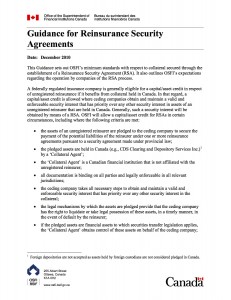 In December 2010, OSFI released its Guidance for Reinsurance Agreements, which sets out OSFI’s expectations with respect to Reinsurance Security Agreements (“RSAs”) where capital/asset credit is being sought by a Canadian licensed insurer that has ceded risks to an unlicensed foreign reinsurer. In order to obtain capital/asset credit when an RSA has been entered into, the Canadian licensed cedant must obtain a legal opinion asserting that a valid and enforceable security interest, that has priority over any other security interest in the pledged assets, has been or will be created in its favour for the type of assets covered by the legal opinion. This legal opinion must then be filed with OSFI’s Securities Administration Unit.
In December 2010, OSFI released its Guidance for Reinsurance Agreements, which sets out OSFI’s expectations with respect to Reinsurance Security Agreements (“RSAs”) where capital/asset credit is being sought by a Canadian licensed insurer that has ceded risks to an unlicensed foreign reinsurer. In order to obtain capital/asset credit when an RSA has been entered into, the Canadian licensed cedant must obtain a legal opinion asserting that a valid and enforceable security interest, that has priority over any other security interest in the pledged assets, has been or will be created in its favour for the type of assets covered by the legal opinion. This legal opinion must then be filed with OSFI’s Securities Administration Unit.
In addition, OSFI has stated that it expects companies to have a Board, or committee of the Board, approved policy requiring management to confirm to the Board, or committee thereof, from time to time but at a minimum once every two years, that a valid and enforceable security interest that has priority over any other security interest in the pledged assets continues to be created in their favour, including where changes have been made to personal property security legislation or securities transfer legislation in the province or territory where the assets are held. OSFI states that the confirmation should either state that the opinion may still be relied upon or that subsequent changes to legislation do not affect the validity of the opinion or, alternatively, a new opinion can be provided.
Canadian licensed cedants are reminded that these confirmations are necessary every two years at a minimum, and are encouraged to be in contact with the legal firms who originally provided the RSA opinions in order to obtain such confirmation. You can see the full text of OSFI’s Guidance for Reinsurance Agreements by clicking here.
OSFI’s New Corporate Governance Guideline
OSFI has released its new Corporate Governance Guideline (the “Guideline”), which sets out its corporate governance expectations for all federally regulated financial institutions (other than foreign branches).
Walker Sorensen LLP is pleased to announce its association with Independent Review Inc. and RiskOnBoard Inc. as THE INDEPENDENT REVIEW GROUP (“IRG”). IRG has been established to assist financial institutions in complying with the requirements under the new Guideline.
Feel free to contact us to learn more about how IRG can help your institution comply with the Guideline’s requirement. Or click here to learn more about IRG.

